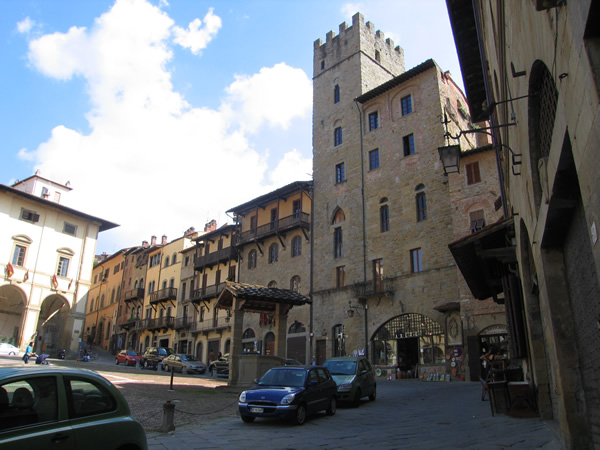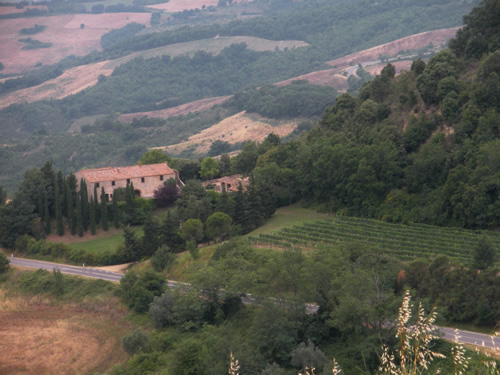Working in Italy
Jobs in Tuscany and Umbria
By Lucia Mancini

Piazza Grande in Arezzo, Tuscany. Photo © Transitons Abroad.
I have lived in Tuscany for over five years in Arezzo and the smaller town of Chiusi (Siena). My friends back home always ask me how to find employment in Italy. Let's be upfront: Finding work in this beautiful but often complicated and bureaucratic country takes work. You really have to be innovative with your ideas because of red tape. The best advice I can give is to think creatively and explore all options. I won't discuss how you can get a job at a multinational firm in Italy, such as a transfer to an Italian bank, but rather how to work independently as an entrepreneur for smaller companies.
Of course, you will need all your work papers in proper order to prepare your tax returns and plan to earn your income in Italy. Italian tax laws are complicated, and you should seek an accountant or commercialista to help you.
Should you choose to be an independent consultant, you should always have a written contract binding both parties. You can draft the contract in English. Requesting a small deposit upfront for any work is also wise. The deposit is usually authorized if the client is serious about the work you will render and about paying you.
Self-Employment Visa and Digital Nomads in Italy
Digital nomads and remote workers worldwide have been able to work 6 months out of the year in Italy, but at most 90 days consecutively, per EU regulations. While the promised Digital Nomad Visa is being rolled out as with other European countries such as Portugal, there is another path to employment in Italy that can help you live and work in Tuscany, Umbria, or anywhere in Italy: The Italian Self-Employment visa, which can be renewed. Once in the country, options sometimes open up. Companies may agree to sponsor you if you are technically inclined.
What to Know to Work for Italian Companies
There are several possibilities for someone who wants to work in Italy. Our most significant advantage is our ability to speak English fluently. It has opened many more doors for me than the MBA I possess.
Know Your Regions in Italy
Employment in Italy is regionally oriented, and the best research you can do before coming to Italy is to study the region where you plan to work. Ask yourself the following questions: What is the primary industry (ies) that this city or town is involved with? For instance, the city of Arezzo is Italy's gold jewelry manufacturing capital, and it has hundreds of big and small jewelry companies that export and may be looking for fluent English speakers. What is the up-and-coming industry or company of this town? News events will steer you toward new health spas, museums, facilities, tourism offices, etc. What is the history, culture, and attitude of the townspeople? Are they open to foreigners? What products do they excel in producing? For instance, the towns of Montepulciano and Montalcino are famous wine-producing centers with numerous companies that export to the U.S. These could be excellent venues for English-speaking people.

A typical landscape in Tuscany. Photo © Transitions Abroad.
Tourism and Tourism-Related Jobs
In Tuscany and Umbria, there are hotels, inns, bed and breakfast establishments, agriturismo (farm holiday homes), vacation villas, thermal spas, and restaurants that are always looking for fluent English-speaking people who are computer and internet literate to fill positions as reception desk clerk, management personnel, telephone operators, chambermaids, doormen, waiters, waitresses, etc. These establishments are also looking for people to find foreign clients who are willing to pay a good commission on sales.
It is of great help to contact the local tourist boards for each town you are interested in to get a complete listing of the tourist establishments in the area. You can visit Regione Toscana for tourist board information. On this website, you can find lists of agriturismi or farm holiday homes, wine associations, and health spas. Go to Agriturismo.it for more dedicated listings of agriturismi.
Finding employment is more than just a numbers game; you should analyze which organizations or sectors in your area need someone with your background and abilities. For instance, I found that numerous companies need local native English speakers to assist in their services: cooking tour groups, walking and bicycle tours, painting and art schools, ceramic schools, etc. Many of these are owned and run by American companies. Your role could be booking, guiding tours, or managing the groups and itineraries.
Teaching
Teaching English still remains one of the best employment possibilities. There are two options: teaching privately or teaching at a language school. Many schools require a TEFL license; however, I found a few that did not. I used my town's local Yellow Pages, contacted all the language schools, sent a resume, and then paid an in-person visit. Companies appreciate meeting candidates in person as they feel more comfortable speaking face to face.
Teaching privately can pay up to $30 an hour for individual lessons. I found the best way to find clients is by word of mouth. You may want to put up flyers in strategic spots in your town, like the local bakery, bar, hair salon, etc. You can offer English lessons to bank personnel, post office personnel, other teachers, and school staff.
Real Estate Agencies
A multitude of realtors throughout Italy are always looking for fluent English speakers. Foreigners are buying more and more property in Italy. Agencies owned and run by foreigners or by Italians welcome native English speakers. They, too, can offer a commission-based salary for every client you bring them. Again, you can search the web for the region where you want to live and contact each property agency, such as Toscana Houses.
Some only employ Italians, but some will be looking for native English speakers who can be sponsored.
Property Management
Closely related to property sales is property management. Remember that a foreigner needs certain services once they purchase property in Italy. Property management includes paying bills, gardening, housekeeping, house sitting, pet sitting, and finding renters for their property. I ran into a German couple in Umbria who did quite well with this business. You can place an ad in the many international travel magazines in print or online.
Translations, Interpreting
Sometimes, the best jobs are those you can do from home. Translation work offers this luxury. Of course, your command of the Italian language should be good. You can translate everything from documents to product catalogs to websites from Italian to English.
Often, companies need interpreters to assist them, especially at trade shows. These gigs usually last from three to seven days, and companies pay well, plus cover any expenses you may have, such as lodging and transportation. You can see on the internet which companies will be exhibiting at different trade shows by going to the official website of each trade show organizer. For instance, you can visit the tradeshows website and see if they need an interpreter. Every large city has a convention center and puts on tradeshows.
I found the tourist offices of each city to be very helpful. They sometimes look for native speakers to accompany groups of foreigners on different itineraries. For instance, the tourist office in Citta' della Pieve (Umbria) was very helpful. They organized many group visits for the Perugino Art Exhibit during that summer. They needed native English-speaking people to accompany the groups. Try Umbria Online for
information on itineraries, tours, etc.
Internet Sales
Why not set up a business selling Italian items on the internet. You could be a sales representative for one or more companies. Stick to products that excel in your zone. For instance, in Tuscany and Umbria, traditional food and wine in that town, like cheeses, pasta, wines, and specialty foods like truffles or organic foods. Most small- and medium-sized companies sell less virtually and make relatively basic internet usage. E-commerce is still less widespread than in the U.S. You can research these companies and present yourself in person. Expect an offer of commission on sales and not a salary. For instance, you can visit Wine-Searcher to get complete listings of wine producers in Umbria and Tuscany and contact the ones that seem the most interesting to you.
Best Advice for Finding Work in Tuscany and Umbria
Although it has been difficult at times, my time in Italy has also been an incredible experience. I have met many foreigners who have come and gone and many who have remained. I have seen the most amazing businesses set up. Some have failed. Others have managed and will stick around.
The best advice I could give anyone is to seek out other foreigners, especially in your region. Many expats have years of experience and can steer you toward or away from something. I met many of my non-Italian friends while I was searching for property. Many realtors and related businesses (property managers, architectural firms, property restoration agencies, etc.) are run by foreigners. Pick up the local newspaper that runs ads for realtors and start calling. This is also a great way to meet people who can become a support group, which you develop into a network.
Editor's Note: See our section of articles and resources on Living in Italy: The Best Expatriate Resources for much more on living and working in Italy, including
Tuscany and Umbria.
|
